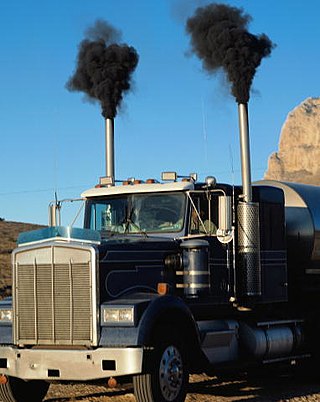
Political economy is a branch of political science and economics studying economic systems and their governance by political systems. Widely studied phenomena within the discipline are systems such as labour markets and financial markets, as well as phenomena such as growth, distribution, inequality, and trade, and how these are shaped by institutions, laws, and government policy. Originating in the 16th century, it is the precursor to the modern discipline of economics. Political economy in its modern form is considered an interdisciplinary field, drawing on theory from both political science and modern economics.

A natural disaster is the highly harmful impact on a society or community following a natural hazard event. Some examples of natural hazard events include floods, droughts, earthquakes, tropical cyclones, lightning strikes, tsunamis, volcanic activity, wildfires. A natural disaster can cause loss of life or damage property, and typically leaves economic damage in its wake. The severity of the damage depends on the affected population's resilience and on the infrastructure available. Scholars have been saying that the term natural disaster is unsuitable and should be abandoned. Instead, the simpler term disaster could be used, while also specifying the category of hazard. A disaster is a result of a natural or human-made hazard impacting a vulnerable community. It is the combination of the hazard along with exposure of a vulnerable society that results in a disaster.

In economics, an externality or external cost is an indirect cost or benefit to an uninvolved third party that arises as an effect of another party's activity. Externalities can be considered as unpriced components that are involved in either consumer or producer market transactions. Air pollution from motor vehicles is one example. The cost of air pollution to society is not paid by either the producers or users of motorized transport to the rest of society. Water pollution from mills and factories is another example. All (water) consumers are made worse off by pollution but are not compensated by the market for this damage. A positive externality is when an individual's consumption in a market increases the well-being of others, but the individual does not charge the third party for the benefit. The third party is essentially getting a free product. An example of this might be the apartment above a bakery receiving some free heat in winter. The people who live in the apartment do not compensate the bakery for this benefit.

Ecotourism is a form of tourism marketed as "responsible" travel to natural areas, conserving the environment, and improving the well-being of the local people. The stated purpose may be to educate the traveler, to provide funds for ecological conservation, to directly benefit the economic development and political empowerment of local communities, or to foster respect for different cultures and human rights.

Ecological economics, bioeconomics, ecolonomy, eco-economics, or ecol-econ is both a transdisciplinary and an interdisciplinary field of academic research addressing the interdependence and coevolution of human economies and natural ecosystems, both intertemporally and spatially. By treating the economy as a subsystem of Earth's larger ecosystem, and by emphasizing the preservation of natural capital, the field of ecological economics is differentiated from environmental economics, which is the mainstream economic analysis of the environment. One survey of German economists found that ecological and environmental economics are different schools of economic thought, with ecological economists emphasizing strong sustainability and rejecting the proposition that physical (human-made) capital can substitute for natural capital.
Overconsumption describes a situation where a consumer overuses their available goods and services to where they can't, or don't want to, replenish or reuse them. In microeconomics, this may be described as the point where the marginal cost of a consumer is greater than their marginal utility. The term overconsumption is quite controversial in use and does not necessarily have a single unifying definition. When used to refer to natural resources to the point where the environment is negatively affected, it is synonymous with the term overexploitation. However, when used in the broader economic sense, overconsumption can refer to all types of goods and services, including manmade ones, e.g. "the overconsumption of alcohol can lead to alcohol poisoning". Overconsumption is driven by several factors of the current global economy, including forces like consumerism, planned obsolescence, economic materialism, and other unsustainable business models and can be contrasted with sustainable consumption.

The exploitation of natural resources describes using natural resources, often non-renewable or limited, for economic growth or development. Environmental degradation, human insecurity, and social conflict frequently accompany natural resource exploitation. The impacts of the depletion of natural resources include the decline of economic growth in local areas; however, the abundance of natural resources does not always correlate with a country's material prosperity. Many resource-rich countries, especially in the Global South, face distributional conflicts, where local bureaucracies mismanage or disagree on how resources should be utilized. Foreign industries also contribute to resource exploitation, where raw materials are outsourced from developing countries, with the local communities receiving little profit from the exchange. This is often accompanied by negative effects of economic growth around the affected areas such as inequality and pollution

Economic sociology is the study of the social cause and effect of various economic phenomena. The field can be broadly divided into a classical period and a contemporary one, known as "new economic sociology".

Geoffrey Martin Hodgson is Emeritus Professor in Management at the London campus of Loughborough University, and also the editor-in-chief of the Journal of Institutional Economics.

Environmental issues in Haiti include a historical deforestation problem, overpopulation, a lack of sanitation, natural disasters, and food insecurity. The major reasons for these environmental issues are corruption, human exploitation, and the embezzlement of taxpayers' funds for personal gains. In addition, there is not sufficient protection or management of the country's natural resources. Other environmental issues, such as decreases in precipitation and more severe natural disasters, will likely arise in Haiti as a result of climate change. Experts agree that Haiti needs to adopt new policies to address both the issues that already exist and to prepare for the effects of climate change.
Economic methodology is the study of methods, especially the scientific method, in relation to economics, including principles underlying economic reasoning. In contemporary English, 'methodology' may reference theoretical or systematic aspects of a method. Philosophy and economics also takes up methodology at the intersection of the two subjects.
Cultural economics is the branch of economics that studies the relation of culture to economic outcomes. Here, 'culture' is defined by shared beliefs and preferences of respective groups. Programmatic issues include whether and how much culture matters as to economic outcomes and what its relation is to institutions. As a growing field in behavioral economics, the role of culture in economic behavior is increasingly being demonstrated to cause significant differentials in decision-making and the management and valuation of assets.

In ecology, resilience is the capacity of an ecosystem to respond to a perturbation or disturbance by resisting damage and subsequently recovering. Such perturbations and disturbances can include stochastic events such as fires, flooding, windstorms, insect population explosions, and human activities such as deforestation, fracking of the ground for oil extraction, pesticide sprayed in soil, and the introduction of exotic plant or animal species. Disturbances of sufficient magnitude or duration can profoundly affect an ecosystem and may force an ecosystem to reach a threshold beyond which a different regime of processes and structures predominates. When such thresholds are associated with a critical or bifurcation point, these regime shifts may also be referred to as critical transitions.
In economics, a spillover is a positive or a negative, but more often negative, impact experienced in one region or across the world due to an independent event occurring from an unrelated environment.
Rural economics is the study of rural economies. Rural economies include both agricultural and non-agricultural industries, so rural economics has broader concerns than agricultural economics which focus more on food systems. Rural development and finance attempt to solve larger challenges within rural economics. These economic issues are often connected to the migration from rural areas due to lack of economic activities and rural poverty. Some interventions have been very successful in some parts of the world, with rural electrification and rural tourism providing anchors for transforming economies in some rural areas. These challenges often create rural-urban income disparities.

Environmental issues are disruptions in the usual function of ecosystems. Further, these issues can be caused by humans or they can be natural. These issues are considered serious when the ecosystem cannot recover in the present situation, and catastrophic if the ecosystem is projected to certainly collapse.

Climate change and poverty are deeply intertwined because climate change disproportionally affects poor people in low-income communities and developing countries around the world. The impoverished have a higher chance of experiencing the ill-effects of climate change due to the increased exposure and vulnerability. Vulnerability represents the degree to which a system is susceptible to, or unable to cope with, adverse effects of climate change including climate variability and extremes.

Social metabolism or socioeconomic metabolism is the set of flows of materials and energy that occur between nature and society, between different societies, and within societies. These human-controlled material and energy flows are a basic feature of all societies but their magnitude and diversity largely depend on specific cultures, or sociometabolic regimes. Social or socioeconomic metabolism is also described as "the self-reproduction and evolution of the biophysical structures of human society. It comprises those biophysical transformation processes, distribution processes, and flows, which are controlled by humans for their purposes. The biophysical structures of society and socioeconomic metabolism together form the biophysical basis of society."

Telecoupling is a strategy that comprehensively analyzes both the socioeconomic and environmental impacts over long distances. The concept of telecoupling is a logical extension of research on coupled human and natural systems, in which interactions occur within particular geographic locations. The telecoupling framework derives from the understanding that all land systems are connected through coupled human and natural systems, and these that social, ecological, and economic impacts are the result. The term telecoupling was first coined by Jianguo Liu as an evolution of the term teleconnection. While teleconnection makes reference to atmospheric sciences only, telecoupling references the integration of multiple scientific disciplines including social science, environmental science, natural science, and systems science. The integration of these dynamic fields of science is what allows the telecoupling framework to comprehensively analyze distal connections that have been previously understudied and unacknowledged.













